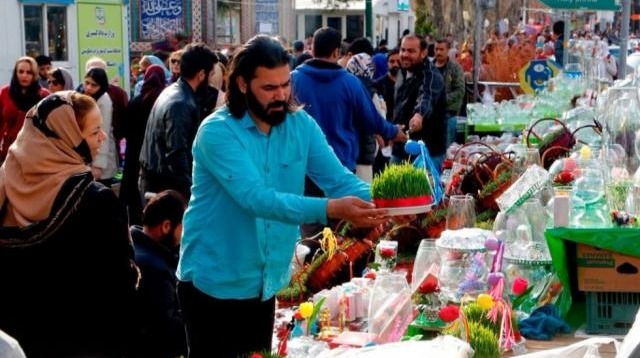Bolton’s fiery style reduces risk of war and promotes the Iranian people’s desire for change
BY IVAN SASCHA SHEEHAN, OPINION CONTRIBUTOR — THE VIEWS EXPRESSED BY CONTRIBUTORS ARE THEIR OWN AND NOT THE VIEW OF THE HILL
President Trump's appointment of former U.S. Ambassador to the United Nations John Bolton as his new national security advisor faces resistance in some quarters. Many of those who oppose the selection do so under the false assumption that Bolton will put the United States on war footing with rogue states, most notably the Islamic Republic of Iran. But the argument ignores a fundamental reality: Tehran already is at war with the West and is single handedly responsible for inciting violence in Yemen, Iraq and Syria. American security interests are already compromised.
U.S. policymakers concerned by the Islamic Republic's malign activities and nuclear pursuits are wise to send a message of strategic assertiveness. Bolton's appointment accomplishes this, and by extension, it makes another war in the Middle East less likely, not more so.
Those who are concerned about the potential for war with Iran should embrace Bolton's appointment and support the administration's efforts to confront Tehran's destabilizing regional influence by taking its theocratic regime to task. The regime's misbehavior only worsened in the run-up to Trump's ascension to the Oval Office, and particularly under the prior administration's cooperative policies that engendered an even greater sense of impunity than the Islamic Republic was used to.
Trump's assertiveness during his first year in office is paying small dividends. U.S. Navy officials recently reported that close encounters between their vessels and those of the Iranian Revolutionary Guard Corps (IRGC), which were commonplace over the previous two years, halted abruptly in August.
To be clear, the new American posture has yet to secure changes in Iran's broader pattern of misconduct, including its support of Bashar al-Assad's crimes against humanity in Syria or its global support of terrorist organizations such as Hezbollah. But there is good reason to believe that future Iranian concessions are likely if the American threat remains credible. This is especially true since Iran faces its most existential threat from its own restive population, which launched a series of anti-government demonstrations in late December and January.
On the occasion of the Iranian New Year celebration of Nowruz this month, opposition leader Maryam Rajavi, the president of the National Council of Resistance of Iran (NCRI), called for the Iranian people to turn the coming year into a "year full of uprisings." The People's Mojahedin Organization of Iran (PMOI/MEK), the key component of the NCRI, played a major role in the protests.
The White House, for its part, signaled early support for that initiativewhen the president expressed full-throated encouragement for the January uprisings, both in public speeches and via Twitter. Given Bolton's past positions, he is likely to strengthen the administration's support for regime change policies. But the prospective national security advisor also understands better than most that the project of regime change in Iran will be spearheaded not by the American military but by the overwhelmingly pro-democratic people of Iran.
The January protests made clear that regime change from within is obtainable, but they also highlighted the importance of international support for the initiative. The demonstrations gave rise to unprecedented calls for the removal of the clerical establishment. Anti-regime slogans were repeated in every major Iranian city and town, and among demographics such as the rural poor that were once considered to be politically inert or even supportive of the ruling regime.
The rebellion ultimately was suppressed after 50 protesters were killed and more than 8,000 were arrested, but the people's fire for change was not extinguished. Tehran's repression was only possible because the international community failed to confront human rights abuses against protesters and treated the regime as a fixture of the Middle East landscape.
This pattern of neglect is unlikely to continue under Bolton's tenure. Bolton's assertiveness is rooted not only in a belief in U.S. military superiority but also in his understanding that Tehran fears internal dissent even more than it does external threats - and his longstanding conviction that the Iranian resistance is a viable alternative to the mullahs.
Tehran's violent reaction to peaceful protests demonstrates that the language of strength is the only language the regime understands. Even under current president Hassan Rouhani's so-called "moderate" leadership, the Islamic Republic continues its illicit activities to every extent it is permitted to do so.
What is true of Tehran's relationship to its own people is also true of its relationship to the rest of the world: The only way to remove the specter of war is to end the regime in Tehran. And the only means of striking a fatal blow to the regime is by supporting the organized uprising by the Iranian people.
In pursuit of this end, credible threats and a more assertive U.S. policy toward Iran may be necessary. But it is unfair to assume that the aim of these policies is war. Quite the contrary, the goal is the avoidance of war through the establishment of a new, democratic system of government - one that is defined by Maryam Rajavi's 10-point plan for the future of the country, a plan that calls for free and fair elections, peaceful relations between Iran and its neighbors, safeguards for the rights of women and minorities, and all of the essential principles that advocates of diplomacy should wish to see take root in the Middle East.
Although some may view Bolton's appointment as the triumph of bellicosity over diplomacy, the selection is better interpreted as the administration's gradual embrace of globalist policies that protect American security interests while also supporting the aspirations of the Iranian people.
Ivan Sascha Sheehan is the incoming executive director of the School of Public and International Affairs at the University of Baltimore. Follow him on Twitter @ProfSheehan.

